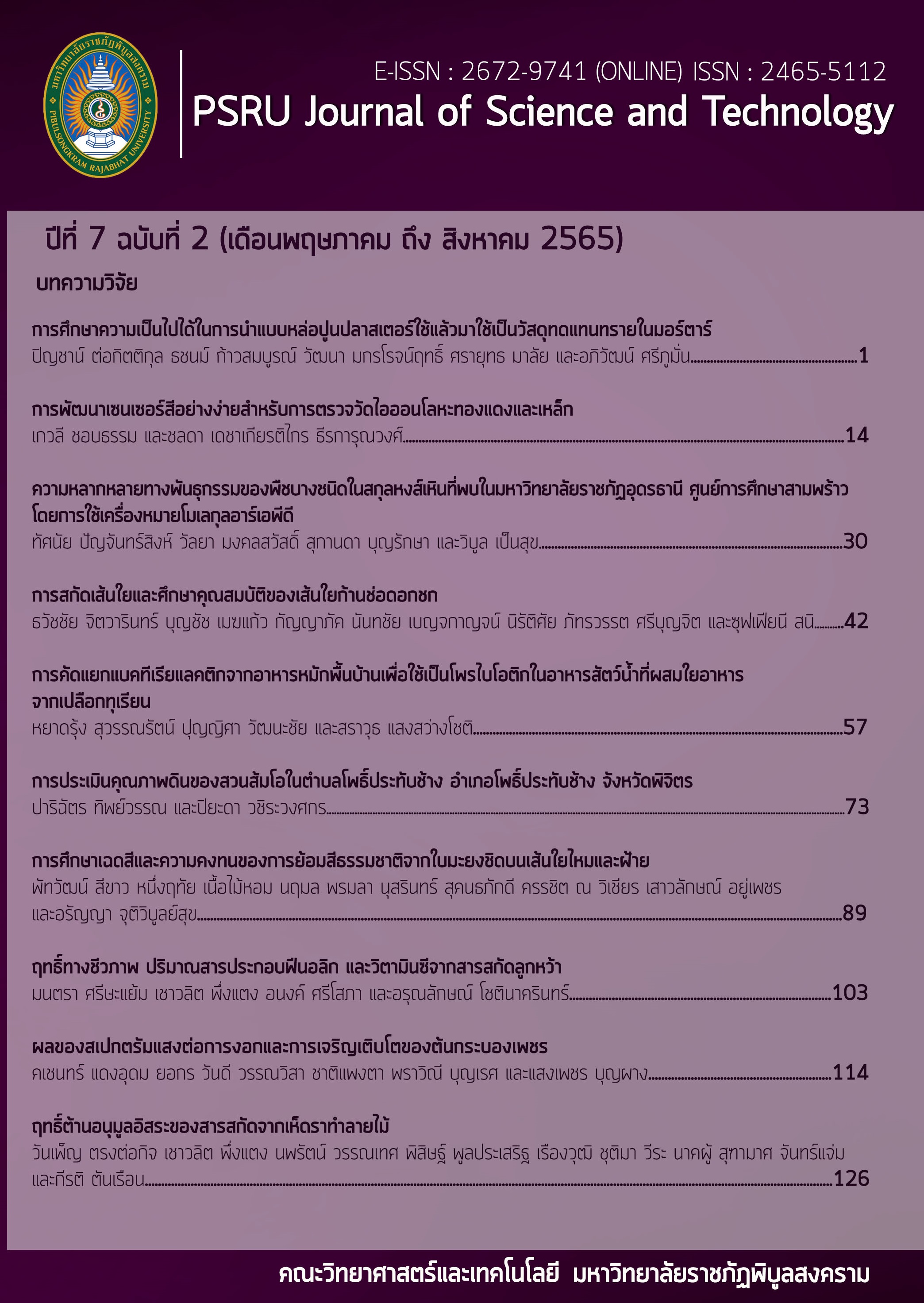GENETIC DIVERSITY OF SOME SPECIES IN GENUS GLOBBA AT SAM PHRAO CAMPUS UDON THANI RAJABHAT UNIVERSITY BY USING RAPD MARKERS
Keywords:
พืชสกุลหงส์เหิน, ความหลากหลายทางพันธุกรรม , เครื่องหมายโมเลกุลอาร์เอพีดีAbstract
This research was to study the genetic diversity of some plants in the genus Globba by using RAPD markers combined with basic plant morphology. The morphological characters of the nine accessions were obtained DNA extraction by using the modified CTAB technique from Doyle & Doyle (1987). The DNA amplification was executed by using a PCR RAPD technique and analyzed the genetic association with UPGMA method. The result showed that the DNA could be amplified with 4 of 25 primers includes OPA-03, OPC-05, OPC-06 and OPX-12 primers. Total 141 DNA bands could be detected with size approximately 250-2500 base pair. Moreover, the phylogenetic analysis shown an interval 0.420-0.938 and resulting in plant categorized into two groups. These are correlated with the plant morphology, by the staminode and appendages characters. The first group has a staminode extending off the floral tube and has two pairs of appendages, Globba siamensis (Hemsl.) Hemsl. The second group has a staminode clinging to the floral tube and has with or without two pairs of appendages, Globba laeta K. Larsen, Globba sp., and Curcuma angustifolia Roxb. However, the RAPD marker is useful for classifying plants within the genus Globba and closely related other genera.
References
เจษฎา เด่นดวงบริพันธ์, สุนิสา แสงวิโรจน์ภัทร์, ปราโมทย์ ไตรบุญ, และมาร์ค นิวแมน. (2019). ความสัมพันธ์ ทางพันธุกรรมระหว่าง Globba expansa (Zingiberaceae) และแท็กซ่าที่เกี่ยวข้องอย่างใกล้ชิดในประเทศไทยโดยใช้การวิเคราะห์เครื่องหมาย HAT-RAPD. Chiang Mai Journal of Science, 46(5), 896-906.
ธัญญะ เตชะศีลพิทักษ์. (2559). การพัฒนาพืชสกุลหงส์เหินเพื่อการค้า (รายงานผลการวิจัย). กรุงเทพฯ: มหาวิทยาลัยเกษตรศาสตร์.
พวงเพ็ญ ศิริรักษ์. (2008). การศึกษาพืชวงศ์ขิง (Zingiberaceae) ในประเทศไทย. NU International journal of Science, 5(2), 119–128.
วันเพ็ญ มานะกุล. (2562). โฆษณาคำขอให้ออกหนังสือรับรองพันธุ์พืชขึ้นทะเบียนตามพระราชบัญญัติพันธุ์พืช พ.ศ. 2518. (ประกาศกรมวิชาการเกษตร) กรมวิชาการเกษตร, สระบุรี.
วรรณวิภา ไชยสงคราม. (2559). ความหลากหลายของพืชวงศ์ขิงและพืชวงศ์ถั่ว ในศูนย์การศึกษาสามพร้าว มหาวิทยาลัยราชภัฏอุดรธานี. อุดรธานี: ศักดิ์ศรีอักษรการพิมพ์.
ศุภฤกษ์ บวรภิญโญ. (2563). ประสิทธิภาพของกระชายขาวต้าน COVID-19. นครปฐม: มหาวิทยาลัยมหิดล.
สุชาดา สุขหร่อง. (2553). ลายพิมพ์ดีเอ็นเอของพืชสมุนไพร: วิธีวิเคราะห์ การใช้ประโยชน์ตัวอย่างจากงานวิจัยและเทคนิคพื้นฐานทางชีววิทยาโมเลกุล. กรุงเทพฯ: โรงพิมพ์แห่งจุฬาลงกรณ์ มหาวิทยาลัย.
สุรินทร์ ปิยะโชคนากุล. (2545). จีโนมและเครื่องหมายดีเอ็นเอ ปฏิบัติการอาร์เอพีดีและเอเอฟแอลพี.กรุงเทพฯ: สํานักพิมพ์มหาวิทยาลัยเกษตรศาสตร์.
สุรินทร์ ปิยะโชคนากุล. (2552). เครื่องหมายดีเอ็นเอ:จากพื้นฐานสู่การประยุกต์. กรุงเทพฯ: สํานักพิมพ์ มหาวิทยาลัยเกษตรศาสตร์.
สิริพร แจ้งสุทธิวรวัฒน์. (2544). การจำแนกปอสาโดยเทคนิคพันธุศาสตร์โมเลกุล. กรุงเทพฯ: มหาวิทยาลัยเกษตรศาสตร์.
สุรพล แสนสุข, ปิยะพร แสนสุข, และณชยุต จันท์โชติกุล. (2017). ความหลากหลายและการใช้ประโยชน์พื้นบ้าน ของพืชวงศ์ขิง ในจังหวัดหนองคาย ประเทศไทย. วารสารวิทยาศาสตร์ มข., 45(3), 574-594.
Doyle, J.J,& Doyle, J.L. (1987).A rapid DNA isolation procedure for small quantities of fresh leaf tissue. Phytochemical bulletin, 19(1), 11-15.
Larsen, K., & Larsen, S.S. (2006). Gingers of Thailand. Chiamg Mai: Queen Sirikit Botanic Garden (QSBG).
Nei, M.,& Li, W.H. (1979). Mathematical models for studying genetic variation in term of restriction endonucleases. Proc. Natl. Acad. Sci, 76, 5268-5273.
Williams, K.J., Kress W.J., Manos P.S., & Am. J. (2004). The phylogeny, evolution and classification of
the genus Globba and tribe Globbeae (Zingiberaceae). Bot., 91(1), 100-114.
Downloads
Published
How to Cite
Issue
Section
License
Copyright (c) 2022 PSRU Journal of Science and Technology

This work is licensed under a Creative Commons Attribution-NonCommercial-NoDerivatives 4.0 International License.
กองบรรณาธิการขอสงวนสิทธิ์ในการปรับปรุงแก้ไขตัวอักษรและคำสะกดต่างๆ ที่ไม่ถูกต้อง และต้นฉบับที่ได้รับการตีพิมพ์ในวารสาร PSRU Journal of Science and Technology ถือเป็นกรรมสิทธิ์ของคณะวิทยาศาสตร์และเทคโนโลยี มหาวิทยาลัยราชภัฏพิบูลสงคราม และ
ผลการพิจารณาคัดเลือกบทความตีพิมพ์ในวารสารให้ถือมติของกองบรรณาธิการเป็นที่สิ้นสุด







